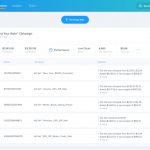What Luxury Can Learn From Artificial Intelligence
What Luxury Can Learn From Artificial Intelligence
The in-store experience has never been more valuable than it is for luxury brands today. In an industry where marketing is heavily focused on the product experience, it can be hard to imagine an alternate reality where that level of live, in-person engagement can be replicated digitally. However, brands are now confronted with the challenge of maintaining relevance among loyal followers while also attracting a new generation of consumers.

The double-digit growth of 2010-13 has dwindled, and e-commerce is starting to represent more and more of the industry’s total sales. Amazon and Walmart have charted formidable digital territory, with the former raking in 44% of all U.S. e-commerce sales, and Walmart aiming to grow online sales as much as 40% by 2019. But despite the inventory and promotional deluge, consumers still put a premium on personalization.
Therefore, the key is to not lose focus on the luxury industry’s most venerable pillar: customer service. Artificial intelligence can help brands evolve in the digital world while maintaining that exceptional customer service by building lasting and highly personalized relationships with consumers.
Designing Data
The first thing luxury marketers need to do before implementing any AI strategy is understand what AI can actually do when combined with existing brand data. The hype surrounding machine learning and neutral networks has merely confused and intimidated brands rather than provide helpful guidance or actionable advice.
The fundamental differentiator of AI is that it creates new data, something technologies like business intelligence, segmentation, and data analytics can’t do. By analyzing data points and trends, AI can help marketers discover new behavioral patterns and buyer preferences that ultimately increase ROI. For example, luxury lingerie retailer Cosabella doubled its online subscription base and increased email revenue by more than 60% through AI-driven campaigns.
So how can other luxury retailers get to that point? Existing data is key, and marketers need to know how their brand obtains, manages and maintains precious customer information. Unorganized or incorrect data is “dirty” data and costs the US about $3 trillion per year, according to Harvard Business Review. Migration of data is usually the crux of these issues, so it’s imperative to have plans and policies in place around the movement and organization of the data itself.
Multi-Channel Millennials
As luxury brands continue to make the shift to e-commerce, they should also expect to see more Millennial and Gen Z buyers, Bain & Co. finds, as they are expected to make up 45% of global luxury buyers by 2025.
Luxury marketers may grasp this, but now need to deepen their understanding of how younger buyers are and will continue. Millennials are using, on average, 4.5 devices when interacting with a brand, says Forrester. Generation Z is already leapfrogging that, spending about 11.1 hours on digital content per day.
By properly incorporating AI into an omnichannel marketing strategy, brands and retailers have confidence their customers will experience consistent on-brand and personalized interactions when browsing on their phone, comparing products on a tablet, researching products on a laptop, and completing a purchase in-store.
Scalable Intimacy
The traditional luxury model pushed consumers into brick-and-mortar store visits, hoping salespersons’ interactions provided that personalized touch. However, with the move to e-commerce luxury brands will need to find new ways to deliver that personalized experience online. Many brands are turning to AI for help — 60% of e-commerce and retailers anticipate establishing AI marketing strategies within the year, according to an Emarsys study conducted with Forrester. Further, 73% of consumers gravitate toward brands that personalize their shopping experience, which of course results in brand loyalty.
AI allows digital platforms to deliver personalized experiences at scale. From purchasing history, clothing size down to style preferences, AI can unlock this potential with the click of a mouse, and for millions of different individuals simultaneously. That is the true trademark of customer service.
MediaPost.com: Search Marketing Daily
(38)













